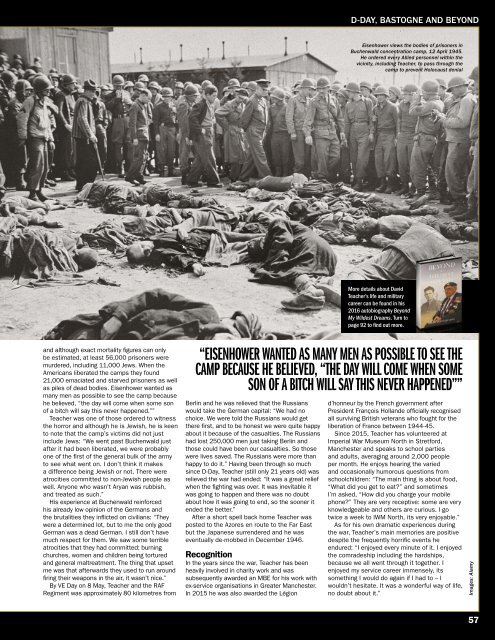Create successful ePaper yourself
Turn your PDF publications into a flip-book with our unique Google optimized e-Paper software.
D-DAY, BASTOGNE AND BEYOND<br />
Eisenhower views the bodies <strong>of</strong> prisoners in<br />
Buchenwald concentration camp, 12 April 1945.<br />
He ordered every Allied personnel within the<br />
vicinity, including Teacher, to pass through the<br />
camp to prevent Holocaust denial<br />
More details about David<br />
Teacher’s life and military<br />
career can be found in his<br />
2016 autobiography Beyond<br />
My Wildest Dreams. Turn to<br />
page 92 to find out more.<br />
and although exact mortality figures can only<br />
be estimated, at least 56,000 prisoners were<br />
murdered, including 11,000 Jews. When the<br />
Americans liberated the camps they found<br />
21,000 emaciated and starved prisoners as well<br />
as piles <strong>of</strong> dead bodies. Eisenhower wanted as<br />
many men as possible to see the camp because<br />
he believed, “the day will come when some son<br />
<strong>of</strong> a bitch will say this never happened.””<br />
Teacher was one <strong>of</strong> those ordered to witness<br />
the horror and although he is Jewish, he is keen<br />
to note that the camp’s victims did not just<br />
include Jews: “We went past Buchenwald just<br />
after it had been liberated, we were probably<br />
one <strong>of</strong> the first <strong>of</strong> the general bulk <strong>of</strong> the army<br />
to see what went on. I don’t think it makes<br />
a difference being Jewish or not. There were<br />
atrocities committed to non-Jewish people as<br />
well. Anyone who wasn’t Aryan was rubbish,<br />
and treated as such.”<br />
His experience at Buchenwald reinforced<br />
his already low opinion <strong>of</strong> the Germans and<br />
the brutalities they inflicted on civilians: “They<br />
were a determined lot, but to me the only good<br />
German was a dead German. I still don’t have<br />
much respect for them. We saw some terrible<br />
atrocities that they had committed: burning<br />
churches, women and children being tortured<br />
and general maltreatment. The thing that upset<br />
me was that afterwards they used to run around<br />
firing their weapons in the air, it wasn’t nice.”<br />
By VE Day on 8 May, Teacher and the RAF<br />
Regiment was approximately 80 kilometres from<br />
“EISENHOWER WANTED AS MANY MEN AS POSSIBLE TO SEE THE<br />
CAMP BECAUSE HE BELIEVED, “THE DAY WILL COME WHEN SOME<br />
SON OF A BITCH WILL SAY THIS NEVER HAPPENED””<br />
Berlin and he was relieved that the Russians<br />
would take the German capital: “We had no<br />
choice. We were told the Russians would get<br />
there first, and to be honest we were quite happy<br />
about it because <strong>of</strong> the casualties. The Russians<br />
had lost 250,000 men just taking Berlin and<br />
those could have been our casualties. So those<br />
were lives saved. The Russians were more than<br />
happy to do it.” Having been through so much<br />
since D-Day, Teacher (still only 21 years old) was<br />
relieved the war had ended: “It was a great relief<br />
when the fighting was over. It was inevitable it<br />
was going to happen and there was no doubt<br />
about how it was going to end, so the sooner it<br />
ended the better.”<br />
After a short spell back home Teacher was<br />
posted to the Azores en route to the Far East<br />
but the Japanese surrendered and he was<br />
eventually de-mobbed in December 1946.<br />
Recognition<br />
In the years since the war, Teacher has been<br />
heavily involved in charity work and was<br />
subsequently awarded an MBE for his work with<br />
ex-service organisations in Greater Manchester.<br />
In 2015 he was also awarded the Légion<br />
d’honneur by the French government after<br />
President François Hollande <strong>of</strong>ficially recognised<br />
all surviving British veterans who fought for the<br />
liberation <strong>of</strong> France between 1944-45.<br />
Since 2015, Teacher has volunteered at<br />
Imperial <strong>War</strong> Museum North in Stretford,<br />
Manchester and speaks to school parties<br />
and adults, averaging around 2,000 people<br />
per month. He enjoys hearing the varied<br />
and occasionally humorous questions from<br />
schoolchildren: “The main thing is about food,<br />
“What did you get to eat?” and sometimes<br />
I’m asked, “How did you charge your mobile<br />
phone?” They are very receptive: some are very<br />
knowledgeable and others are curious. I go<br />
twice a week to IWM North, its very enjoyable.”<br />
As for his own dramatic experiences during<br />
the war, Teacher’s main memories are positive<br />
despite the frequently horrific events he<br />
endured: “I enjoyed every minute <strong>of</strong> it. I enjoyed<br />
the comradeship including the hardships,<br />
because we all went through it together. I<br />
enjoyed my service career immensely, its<br />
something I would do again if I had to – I<br />
wouldn’t hesitate. It was a wonderful way <strong>of</strong> life,<br />
no doubt about it.”<br />
Images: Alamy<br />
57


















